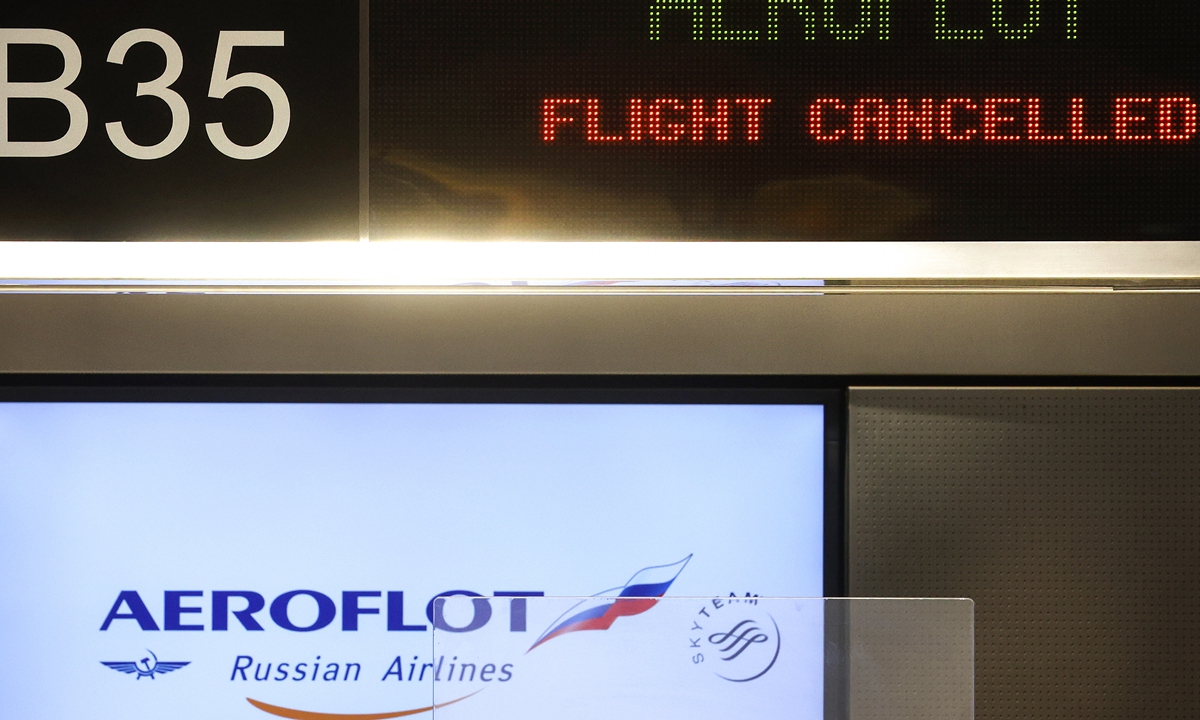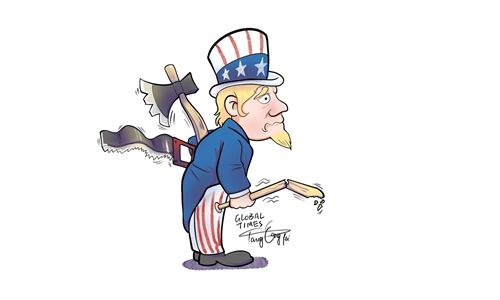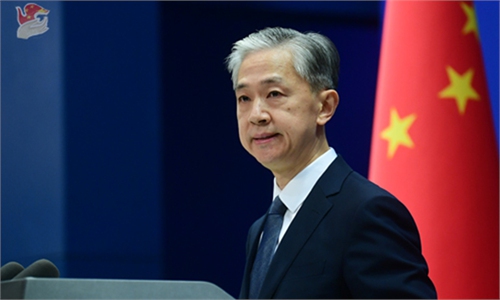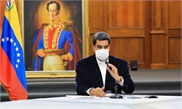
A sign reads 'Flight Cancelled' at the Aeroflot check-in counter in the Tom Bradley International Terminal at Los Angeles International Airport on March 02, 2022 in Los Angeles, California, the US. Photo: VCG
The scale of sanctions on Russia over the Ukraine crisis has been expanding into sports, culture and even education, which usually hold politically neutral stances. Chinese experts and netizens ridiculed the abuse of unilateral sanctions, which have become a means of political correctness of punishing Russia with both symbolic and concrete measures. Some considered that such absurd sanctions or boycotts of Russian people reflect an abnormal hatred, which won't help solving the Ukraine crisis.
After an international cat fancier society decided to slap harsh restrictions against cats bred in Russia and those belonging to people who live in Russia, which became the top trending news on Chinese social media and was ridiculed by many netizens on Wednesday, the Global Times found that besides the economy, finance and trade, a number of other sectors such as cultural activities, sports, education and entertainment related to Russia have become the new targets of the West-led sanctions against Russia's military operation in Ukraine.
Since the conflict between Russia and Ukraine began, Western countries have made a dazzling array of sanctions against Russia. In the fields of the economy, finance, energy and technology, some countries have agreed to exclude a number of Russian banks from SWIFT, an international payment system used by thousands of financial institutions.
Several international sports organizations such as FIFA banned Russian athletes from attending international competitions; Disney, Warner and SONY suspended the release of films in Russia; Russians were banned from the Eurovision Song Contest, and Russian art exhibitions, concerts and ballet performances were also cancelled in Western countries, according to media reports.
Most recently, performances by multiple Russian ballet companies have been called off in the UK amid a boycott of the country's high-profile cultural institutions, and prominent musicians like Valery Gergiev, who was fired by the Munich Philharmonic for his stance on Russia's military operation in Ukraine, and opera star Anna Netrebko who canceled a number of performances, have been caught in the controversy, which some media call a "culture war."
The involvement of some Western companies and associations has made it clear that the values of "art know no borders" and "sports have nothing to do with politics" will also become empty talk, experts said.
The essence of sanctions is unilateral punishment. By suspending political exchanges, restricting import and export, and restricting investment and financing activities, the sanctions aim to punish those who violate the rules and wrong behavior that challenge the moral conscience and harm the public interest, Dong Shaopeng, a senior research fellow at the Chongyang Institute for Financial Studies at Renmin University of China, told the Global Times on Thursday.
"Under certain conditions, sanctions are reasonable as a means to correct imbalances in the political and economic fields," Dong said.
However, under hegemonic politics, the reasonable part of the sanctions have been played down while the US-led Western bloc often uses sanctions for its own interests and expands the scale of sanctions in bullying others or making excuses to abuse sanctions, Dong noted. "It pushes such a culture of sanctions into an extreme level."
The final settlement of the Ukraine crisis requires abandoning the Cold War mentality, said Ambassador Zhang Jun at the UN General Assembly on the Resolution on Ukraine on Wednesday. "Blindly exerting pressure and imposing sanctions and creating division and confrontation will only further complicate the situation, and result in a rapid negative spillover of the crisis, and affect even more countries," he said.
There is no doubt that the sanctions against Russia have spilled over into the entertainment sector and onto ordinary Russian civilians, which should not be politicized, experts said.
"The so-called boycotts showed that the anger in Europe toward Russia has reached a certain level, engulfing ordinary citizens in this battle. However, it's not Russian people who should take the responsibility for the current situation but the Russian government," Zhang Hong, an Eastern European studies expert from the Chinese Academy of Social Sciences, told the Global Times on Thursday.
Can some absurd sanctions force people in the entertainment and sports fields to sanction Russia and can this be understood as a form of Western hegemony? Zhang believed that it reflected an abnormal hatred.



